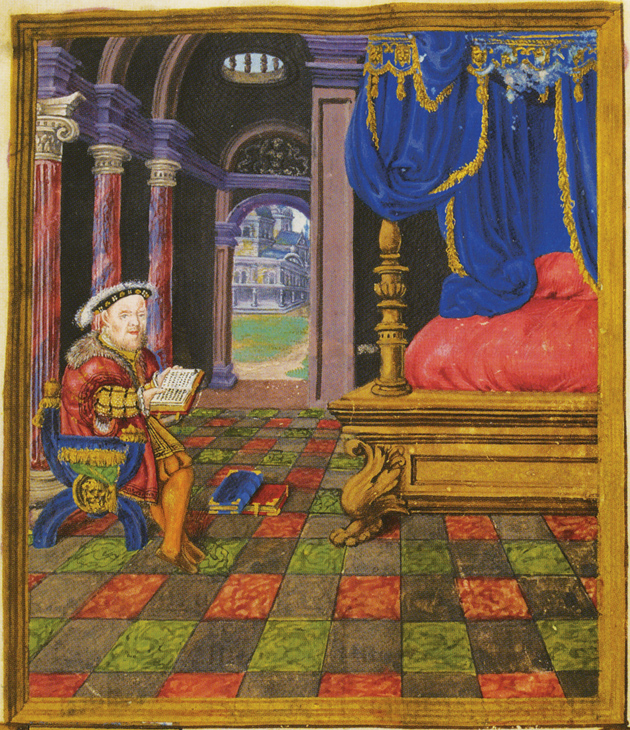Historians cannot pinpoint the moment when Henry VIII decided to get rid of his second wife. To marry Anne Boleyn, he had overturned the religious and political order of Europe, breaking with Rome and setting himself up as head of the English church. But Anne, who he believed had promised him a son, had presented him with a daughter, Elizabeth; her next two pregnancies had not come to term. Henry’s chief minister Thomas Cromwell had his own quarrels with the queen. By spring 1536 her existence threatened his foreign policy aims. No state outside England recognized Henry’s second marriage, which was becoming an embarrassment and an encumbrance.
But how to be rid of her? The possibility of an annulment, and Anne’s quiet departure, seems to have been canvassed and rejected. She would, it was decided, have to be forced out, charged with treason, treason evidenced by multiple adulteries, including an incestuous affair with her brother George, Lord Rochford. The charges sound deeply unlikely, but were made to stick for a few days during May 1536. It seems possible that Cromwell did not know how he would stage the coup, till he found himself in the middle of it.
Tradition has seen Jane Rochford, George’s wife, as a chief agent in the downfall of the Boleyns. It would be pleasant to go against tradition, but difficult in this case. In Hilary Mantel’s Bring Up the Bodies, the sequel to Wolf Hall (2009), it is she, as a woman close to the queen, who sets ticking the mechanism of Anne Boleyn’s downfall. In the following passage she talks with Thomas Cromwell. Henry Norris and Francis Weston are prominent courtiers, and close to the king.
Henry Holt has just published Bring Up the Bodies.
Sunday: “I wish you had been here this morning,” Lady Rochford says with relish. “It was something to witness. The king and Anne in the great window together, so everybody in the courtyard below could see them. The king has heard about the quarrel she had with Norris yesterday. Well, the whole of England has heard of it. You could see the king was beside himself, his face was crimson. And she holding up the little princess to him, as if to say, ‘Husband, how can you doubt this is your daughter?’”
“You are supposing that was her question. You could not hear what was said.” His voice is cold; he hears it himself, its coldness surprises him.
“Not from where I stood. But I doubt it bodes any good to her.”
“Did you not go to her, to comfort her? She being your mistress?”
“No. I went looking for you.” She checks herself, her tone suddenly sobered. “We—her women—we want to speak out and save ourselves. We are afraid she is not honest and that we will be blamed for concealing it.”
“In the summer,” he says, “not last summer but the one before, you said to me that you believed the queen was desperate to get a child, and was afraid the king could not give her one. You said he could not satisfy the queen. Will you repeat it now?”
“I’m surprised you don’t have a note of our talk.”
“It was a long talk, and—with respect to you, my lady—more full of hints than particulars. I want to know what you would stand to, if you were to be put on oath before a court.”
“Who is to be tried?”
“That is what I am hoping to determine. With your kind help.”
He hears these phrases flow out of him. With your kind help. Yourself not offended. Saving his Majesty.
“You know it has come out about Norris and Weston,” she says. “How they have declared their love for her. They are not the only ones.”
“You do not take it as just a form of courtesy?”
“For courtesy, you do not sneak around in the dark. On and off barges. Slipping through gates by torchlight. Bribes to the porters. It has been happening these two years and more. You cannot know who you have seen, where and when. You would be sharp if you could catch any of them.” She pauses, to be sure she has his attention. “Let us say the court is at Greenwich. You see a certain gentleman, one who waits on the king. And you suppose his tour of duty is over, and you imagine him to be in the country; but then you are about your own duties with the queen, and you see him whisking around the corner. You think, why are you here? Norris, is that you? Many a time I have thought some one of them is at Westminster, and then I spot him at Richmond. Or he is supposed to be at Greenwich, and there he is at Hampton Court.”
Advertisement
“If they change their duties among themselves, it is no matter.”
“But I do not mean that. It is not the times, Master Secretary. It is the places. It is the queen’s gallery, it is her antechamber, it is her threshold, and sometimes the garden stair, or a little gate left unlocked by some inadvertence.” She leans forward, and her fingertips brush his hand as it lies on his papers. “I mean they come and go by night. And if anyone queries why they should be there, they say they are on a private message from the king, they cannot say to whom.”
He nods. The privy chamber carry unwritten messages, it is one of their tasks. They come and go between the king and his peers, sometimes between the king and foreign ambassadors, and no doubt between the king and his wife. They do not brook questioning. They cannot be held to account.
Lady Rochford sits back. She says softly, “Before they were married, she used to practice with Henry in the French fashion. You know what I mean.”
“I have no idea what you mean. Were you ever in France yourself?
“No. I thought you were.”
“As a soldier. Among the military, the ars amatoria is not refined.”
She considers this. A hardness creeps into her voice. “You wish to shame me out of saying what I must say, but I am no virgin girl, I see no reason not to speak. She induced Henry to put his seed otherwise than he should have. So now he berates her, that she caused him to do so.”
“Opportunities lost. I understand.” Seed gone to waste, slid away in some crevice of her body or down her throat. When he could have been seeing to her in the honest English way.
“He calls it a filthy proceeding. But God love him, Henry does not know where filth begins. My husband George is always with Anne. But I’ve told you that before.”
“He is her brother, I suppose it is natural.”
“Natural? Is that what you call it?”
“My lady, I know you would like it to be a crime to be a fond brother and a cold husband. But there is no statute that makes it so, and no precedent for your relief.” He hesitates. “Do not think I am without sympathy for you.”
For what can a woman like Jane Rochford do when circumstances are against her? A widow well-provided can cut a figure in the world. A merchant’s wife can with diligence and prudence take business matters into her hands, and squirrel away a store of gold. A laboring woman ill-used by a husband can enlist robust friends, who will stand outside her house all night and bang pans, till the unshaven churl tips out in his shirt to chase them off, and they pull up his shirt and mock his member. But a young married gentlewoman has no way to help herself. She has no more power than a donkey; all she can hope for is a master who spares the whip. “You know,” he says, “that your father Lord Morley is a scholar I hold in great esteem. Have you never advised with him?”
“What is the use?” She is scornful. “When we married he said he was doing his best for me. It is what fathers say. He paid less mind to contracting me to Boleyn than he would to selling a hound puppy. If you think there’s a warm kennel and a dish of broken meats, what more do you need to know? You don’t ask the animal what it wants.”
“So you have never thought you might be released from your marriage?”
“No, Master Cromwell. My father went into everything thoroughly. Just as thoroughly as you would expect, of a friend of yours. No previous promise, no pre-contract, no shadow of one. Even you and [Archbishop] Cranmer between you couldn’t get us an annulment. On the wedding day we sat at our supper with our friends, and George told me, I am only doing this because my father says I must. That was good hearing, you will agree, for a girl of twenty who cherished hopes of love. And I defied him, I said the same back to him: I said, if my father did not enforce me, I would be far from you, sir. So then the light faded and we were put to bed. He put his hand out and flipped my breast and said, I have seen plenty of these, and many better. He said, lie down, open your body, let us do our duty and make my father a grandfather, and then if we have a son we can live apart. I said to him, then do it if you think you can, pray God you may set seed tonight, and then you may take your dibber away and I need not look at it again.” A little laugh.
Advertisement
“But I am barren, you see. Or so I must believe. It may be that my husband’s seed is bad or weak. God knows, he spends it in some dubious places. Oh, he is a gospeller, is George, St. Matthew be his guide and St. Luke protect him. No man as godly as George, the only fault he finds with God is that he made folk with too few orifices. If George could meet a woman with a quinny under her armpit, he would call out ‘Glory Be’ and set her up in a house and visit her every day, until the novelty wore off. Nothing is forbidden to George, you see. He’d go to it with a terrier bitch if she wagged her tail at him and said bow-wow.”
For once he is struck silent. He knows he will never get it out of his mind, the picture of George in a hairy grapple with a little ratting dog.
She says, “I am afraid he has given me a disease and that is why I have never conceived a child. I think there is something destroying me from the inside. I think I might die of it one day.”
She had asked him once, if I die suddenly, have them cut open my corpse to look inside. In those days she feared poison. Now she fears a corruption in her blood. He murmurs, my lady, you have borne a great deal. He looks up. “But this is not to the point. If George knows something about the queen that the king should be told, I can bring him to witness, but I cannot know he will speak out. I can hardly compel the brother against the sister.”
She says, “I am not talking about his being a witness. I am telling you he spends time in her chamber. Alone with her. And the door closed.”
“In conversation?”
“I have been to the door and heard no voices.”
“Perhaps,” he says, “they join in silent prayer.”
“I have seen them kiss.”
“A brother may kiss his sister.”
“He may not, not in that way.”
He picks up his pen. “Lady Rochford, I cannot write down, ‘He kissed her in that way.’”
“His tongue in her mouth. And her tongue in his.”
“You want me to record that?”
“If you fear you won’t remember it.”
He thinks, if this comes out in a law court the city will be in an uproar, if it is mentioned in parliament the bishops will be frigging themselves on their benches. He waits, his pen poised. “Why would she do this, such a crime against nature?”
“The better to rule. Surely you see it? She is lucky with Elizabeth, the child is like her. But suppose she gets a boy and it has Weston’s long face? Or it looks like Will Brereton, what will the king say to that? But they cannot call it a bastard if it looks like a Boleyn.”
Brereton too. He makes a note. He remembers how Brereton once joked with him he could be in two places at once: a chilly joke, a hostile joke, and now, he thinks, now at last, I laugh. Lady Rochford says, “Why do you smile?”
“I have heard that in the queen’s rooms, among her lovers, there was talk of the king’s death. Did George ever join in with it?”
“It would kill Henry if he knew how they laugh at him. How his member is discussed.”
“I want you to think hard,” he says. “Be sure of what you are doing. If you give evidence against your husband, in a court of law or to the council, you may find yourself a lonely woman in the years to come.”
Her face says, am I now so rich in friends? “I will not bear the blame,” she says. “You will, Master Secretary. I am thought a woman of no great wit or penetration. And you are what you are, a man of resource who spares no one. It will be thought that you drew the truth out of me, whether I was willing or no.”
It seems to him little more need be said. “In order to sustain that notion, it will be necessary for you to contain your pleasure and feign distress. Once George is arrested, you must petition for mercy for him.”
“I can do that.” Jane Rochford puts out the tip of her tongue, as if the moment were sugared and she can taste it. “I am safe, for the king will take no notice, I can guarantee.”
“Be advised by me. Talk to no one.”
“Be advised by me. Talk to Mark Smeaton.”
He tells her, “I am going to my house at Stepney. I have asked Mark for supper.”
“Why not entertain him here?”
“There has been disturbance enough, don’t you think?”
“Disturbance? Oh, I see,” she says.
This Issue
June 21, 2012
Real Cool
How Texas Messes Up Textbooks
Mothers Beware!





